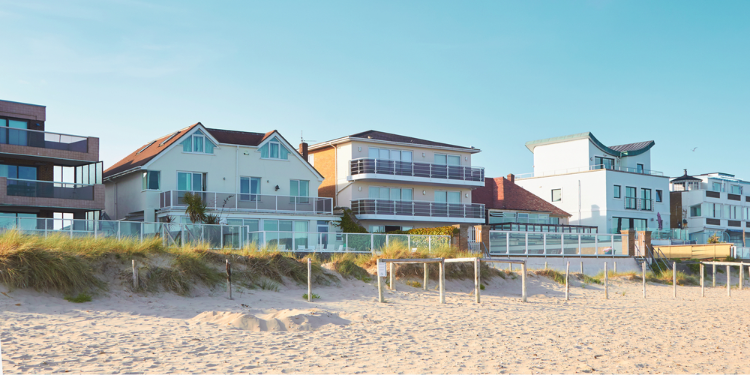
In 2023, real estate remains one of the preferred investments of expats. Inflationary trends and housing crises in several major economies do not undermine the confidence of the investors. Real estate property is considered a secure investment. But how to choose the right place to invest in? Should you buy property along the coast or inland?
The best countries for real estate investment
It's fair to say that the best countries to invest in are those corresponding to your preferences: wanting a property by the ocean or inland, desire to invest relatively «close» to your main residence (in the same country or in the neighboring country) or, on the contrary, a remote place, etc. Thus, some buyers opt for tourist destinations such as Thailand or Portugal. Others prefer Canada, a country popular with casual travelers, students and foreign workers.
However, ensure you are aware of your host country's regulations regarding property before investing. In Portugal, which has terminated its Golden Visa policy, the housing crisis has prompted the government to take a closer look at the real estate investments of expatriates. Its reform of the law on capital gains on property has not convinced all investors. Since 1st January, Canada has banned foreigners (with a few exceptions) from buying property. The measure, which should last 2 years, is expected to stem the crisis by stabilizing market prices. Although the government has been more lenient on new immigrants holding work permits since 1st April, some measures are still being applied.
Tax benefits and long-term plans
The ideal country for property investment can also be one with tax benefits. The United Arab Emirates (UAE), for instance, is very popular with expatriates, who make up the vast majority of the country's population. The country's advantageous tax regime makes it a good place to invest in. Favorable taxation can not only encourage property purchase but also be a factor for considering investment via or not specific programs, such as the Golden Visa. Greece is taking advantage of the end of the Golden Visa in Portugal to attract more foreign investors. The same is true of Switzerland and the UAE, which are highlighting the advantages of this visa (access to citizenship, tax benefits, etc.). New countries like Indonesia are entering the race to attract foreign capital.
The best country to invest in real estate may also be the one to realize your long-term plans. Japan's aging population results in many abandoned houses, and the phenomenon is quite worrisome. More and more real estate projects are being launched at national and local levels. Municipalities are looking for buyers. Some investors may see this as a good way of buying a property at a lower cost in areas with certain advantages (countryside, mountains, etc.). But here again, it's important to make sure that your plans align with those of the local authorities. The reason why properties in rural areas are being sold at competitive prices is that these areas are often underpopulated. Japan's main aim is to repopulate these areas, relieve Tokyo congestion, and not create villages of secondary homes. These factors must be taken into account when planning your project.
Investing in property: How to choose the right location?
After choosing the country to invest in, the question of location arises. Should you invest in a coastal or inland area? Should you buy in a rural area or in the city center? Before making your choice, you should look at the country's legislation. Not all regions are suitable for investment by foreigners.
Pay attention to the country's legislation regarding property
Let's go back to Japan. Since 2018, Japan has been on the hunt for Airbnb, the global leader in short-term rentals. Special laws have been passed to better regulate the sector. The hosts need to register with the authorities, the duration of rentals is reduced, and local authorities are free to tighten restrictions. The highly touristic cities of Kyoto and Tokyo have banned Airbnb rentals in various geographical areas and at various times of the year (especially during peak tourist seasons).
If your aim is to convert your home into a rental property in Japan, you will need to look at the legislation governing the practice before choosing the location for your property investment. The same applies to other countries and in the case of investments made under specific programs, such as the Golden Visa, as the visa may restrict investment to some geographical regions. The Indonesian project, for example, focuses mainly on the highly touristic Bali. While debating whether to maintain or abolish the golden passport, Spain tightened the visa access conditions by encouraging investors to invest in inland and less touristic areas.
Investing in beachfront property
On paper, all seems clear. You could be tempted to purchase a house facing the sea or nearby to be able to enjoy a warm climate all year round. Investing in beachfront properties also means yielding high capital gains. The demand for coastal property, as well as sale prices, has increased substantially since the Covid-19 pandemic. However, buying a beachfront property also involves a high risk.
Again, the host country's legislation may impose restrictions. Coastal property is liable to weather hazards. The risks of heavy rainfall, flash floods, exposure to wind and soil erosion can be more significant. While beachfront properties are outstanding, their prices can fluctuate depending on the location. Identify vulnerable communes and areas defined as "risk zones" before choosing. Take advice from experts in climate risk assessment before signing up for a property. Be extra cautious if the property is found far from your home. The best for you is to go and see the property for yourself.
Investing inland
At first sight, investing inland seems less risky. But again, it all depends on the location of your property. Buying a house in the city center differs from buying in a nearby suburb, the countryside, or the mountains. Each area has its pros and cons. Towns and cities are often more accessible, with good transport networks, local services, shops, schools and infrastructure, etc. It is also easier to find work. There are more activities. Property resale can also be more straightforward. Rural areas also have their advantages. The health crisis has led to an increase in demand for houses in rural and other remote locations. These areas offer more spacious and less expensive properties than those in the cities. In recent years, more and more people have been looking at a "big house with a garden". Besides, rural areas are known to be more friendly and peaceful.
However, properties in inland areas also have their risks, such as wetlands, cracks, nearby forests, and seismic zones. The consequences of human activity need to be considered. Is your property close to an airport, a factory, or an agricultural field? Is it in a high-traffic area with a lot of human activity? You should also consider the infrastructure. There are also grey and white areas. For example, your ideal house at the top of the mountain may have network issues. If you aim to work from home and need the Internet, your project is likely to face some hurdles.
Things you need to consider when investing in real estate overseas
Before jumping on the offer that appeals most to you, you need to think carefully. Do not hesitate to consult real estate professionals in the country where you want to invest. Being aware of the climate and risks in the area where you are going to live is crucial. Also, study prices of local properties.
Learn more about the legislation and your options (primary or secondary residence, rental, purchase-resale, etc.). Some countries are introducing financial incentives to relieve congestion in their capital cities. Locals are being encouraged to move to rural areas and are being given housing and installation grants (for remote working, for example). These measures designed for locals also impact foreigners, particularly investors.
Don't forget about taxation in your home country. Depending on the duration of your stay abroad, your tax residence may change. Do not assume that any money invested in real estate will be tax-exempt. If you are not ready to buy a property abroad, you can opt for private equity, managed by investment funds. However, as with any investment, vigilance and caution are essential.



















